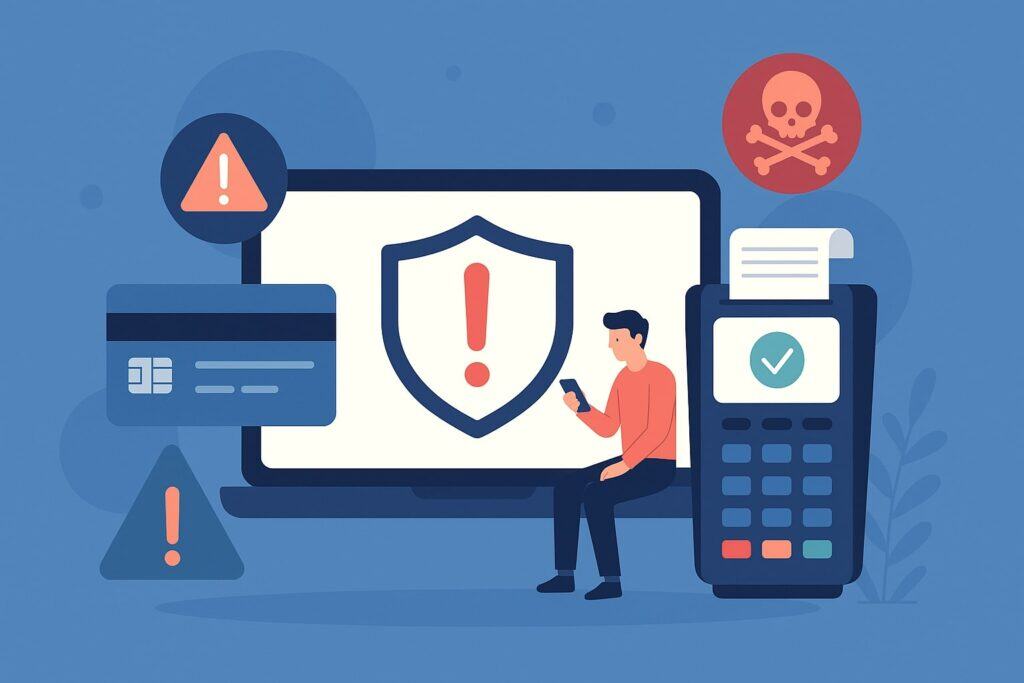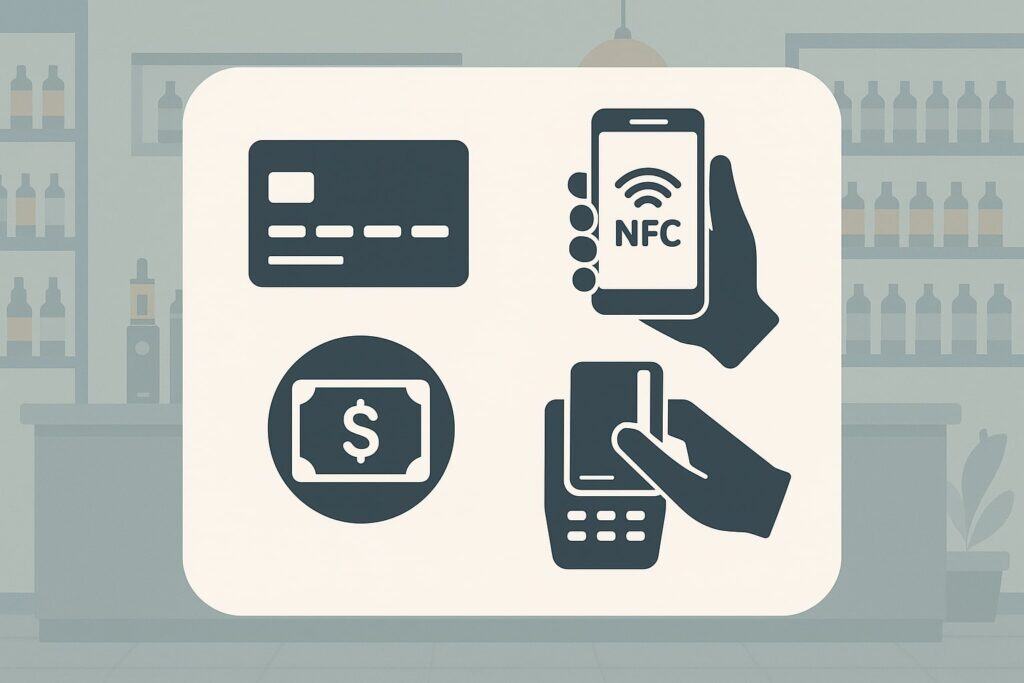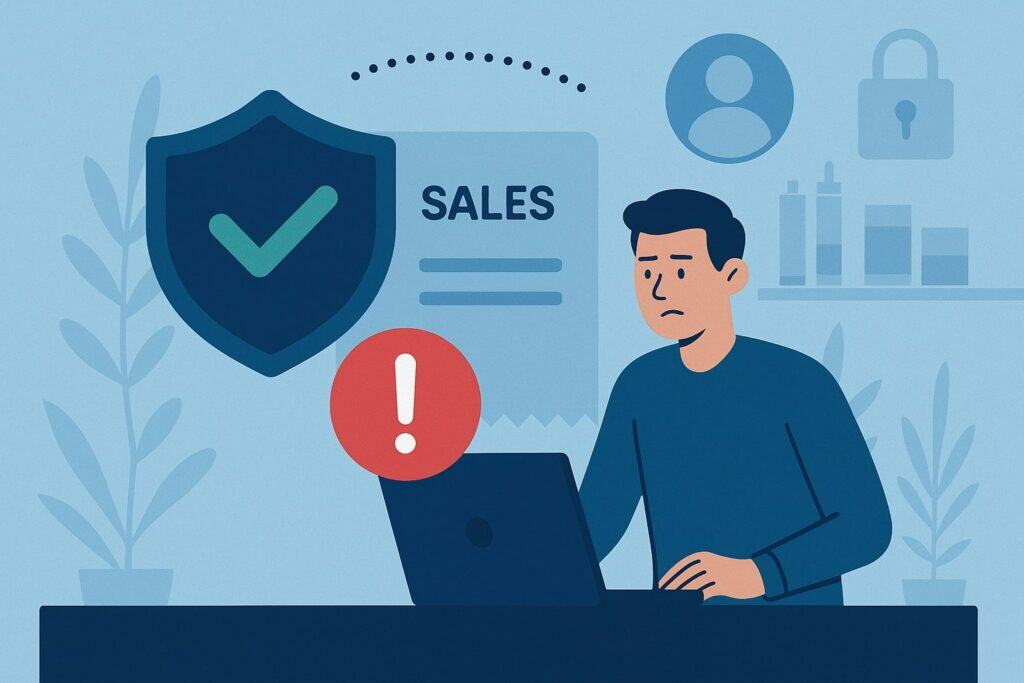
By vapeshoppointofsale September 15, 2025
Vape shops sell age-restricted, highly regulated products, so banks and payment networks treat them as high-risk businesses. Rapidly evolving federal and state laws (FDA tobacco rules, flavor bans, etc.) plus public health concerns mean vape stores face strict compliance demands.
Major card brands like Visa classify e‑cigarettes under tobacco categories. In practice, this means standard merchant accounts often aren’t available or stable for vape merchants, and attempting to use them can lead to account holds or shutdowns.
Why Vape Shops Are “High-Risk”
- Age and Compliance: Vape shops must enforce 21+ age laws. Federal rules require ID checks for every sale and prohibit underage marketing. Breaking these rules carries fines.
- Regulatory Uncertainty: FDA policies and local laws change frequently (e.g. product registration, health warnings, flavor restrictions). Any slip can trigger investigations or penalties.
- Chargeback Exposure: Online vape retailers often see more disputes (chargebacks) than low-risk stores, since consumers can claim “unauthorized” sales or dissatisfaction. High chargeback rates jeopardize normal accounts.
- Public Perception: Negative media about vaping (health scares, underage use) makes processors nervous. Banks avoid reputational risk and may drop merchant accounts if public sentiment turns.
- Payment Network Rules: Visa’s Merchant Data Standards list “electronic cigarettes” under tobacco (MCC 5993). Mastercard similarly requires tobacco vendors (including vape) to register, adding fees and scrutiny.
- Processor Restrictions: Popular gateways like PayPal, Stripe and Square forbid vape sales. Any vape merchant using them risks sudden account termination. (Indeed, thousands of online vape shops lost PayPal accounts after policy changes in 2020.)
These factors combine to block standard accounts. The only reliable option is a high-risk merchant account designed for tobacco/vape industries.
Specialized High-Risk Payment Processing

A high-risk merchant account is tailored to businesses with elevated fraud or legal risk. Compared to a normal account, high-risk processing has:
- Rigorous Underwriting: You must submit detailed documentation (business licenses, compliance policies, financial history, etc.). The application and background check are often lengthy and thorough.
- Higher Fees and Reserves: Rates are higher. Expect elevated transaction fees and possibly a rolling reserve (a percentage of sales held for weeks) to cover potential losses.
- Built-in Fraud Controls: The account or POS typically includes extra fraud prevention (address verification, device fingerprinting, velocity limits, etc.) to reduce chargebacks.
- Chargeback Management: High-risk processors usually offer dispute-resolution services or rapid alerts for disputes. They understand vape chargeback patterns and help merchants respond quickly.
- Ongoing Monitoring and Support: Your account will be reviewed regularly. Processors provide guidance on compliance and often require ID verification tools or POS features built for vape shops.
Table 1: Comparing Standard vs. High-Risk Merchant Accounts
| Feature | Standard Account | High-Risk Account |
|---|---|---|
| Application Process | Fast, minimal documentation | In-depth underwriting, extensive docs |
| Transaction Fees & Costs | Lower fees, no extra reserves | Higher fees, often $500+/yr brand fees and cash reserves |
| Chargeback Handling | Strict limits, may close on disputes | Higher tolerance, specialized chargeback tools |
| Compliance Requirements | Basic PCI compliance | Mandatory age-verification, vape-specific rules |
| Processor Support | Standard support | Expert help, industry knowledge |
Payment Options for Vape Shops

Even with a high-risk account, vape shops should diversify payment methods. Common options include:
- Credit/Debit Cards: With a high-risk merchant account, you can accept major cards. However, be aware some issuers may still decline high-nicotine products on a case-by-case basis. Use address verification (AVS) and CVV checks to cut down fraud.
- ACH Bank Transfers: ACH (Automated Clearing House) lets customers pay by checking account. Fees per transaction are usually lower than cards, and it’s reliable for recurring orders. However, ACH transfers take days to settle and must be protected from fraud (see below). Many high-risk processors offer ACH processing too.
- Cryptocurrencies: A growing number of vape stores accept crypto (Bitcoin, etc.) to bypass traditional gateways. Crypto payments avoid card rules and refunds are irreversible, but prices can be volatile and adoption is limited.
- Gift Cards & Cash: Bricks-and-mortar vape shops often use cash or branded gift cards. Cash has no processing fees but poses theft risk. Gift cards reduce fraud but only work in your own stores.
- Alternative Gateways: Some specialized providers (e.g. LoopPay, industry-specific payment gateways) support vape sales. These often integrate with a high-risk merchant account.
Table 2: Payment Method Pros and Cons
| Payment Method | Pros | Cons |
|---|---|---|
| Credit/Debit Cards | Widely used by customers; fast settling | High processor scrutiny; potential declines if misclassified |
| ACH (Bank Transfer) | Low transaction fees; good for large/recurring payments | Slower (1–3 days); risk of unauthorized debits; must reconcile carefully |
| Cryptocurrency | No card brand restrictions; global | Volatility; limited buyer usage; no chargeback protection |
| Gift Card / Cash | No chargebacks or network bans | Inconvenient for online sales; cash carries security risk |
All high-risk accounts for vape shops typically support multiple methods. For example, a processor might allow both card and ACH or even digital wallets. But each method has fraud risks, so protective measures are crucial.
Preventing Fraud and Chargebacks

Even with a high-risk account, vape merchants must proactively prevent fraud:
- Address & CVV Checks: Always use AVS (Address Verification Service) and require CVV/CVC codes. These filters catch many fraudulent card transactions by verifying the billing address and security code.
- Strong Authentication: Consider 3-D Secure (Verified by Visa/MasterCard SecureCode) on your e-commerce site. It shifts liability back to the issuer if a transaction is challenged.
- Order Verification: Manually verify large or suspicious orders (age-verification calls, photo ID checks) before shipping. Clear refund/return policies and signature-on-delivery can deter disputes.
- Track Shipments: Always ship to confirmed addresses and use delivery confirmation. Retain tracking numbers so you can prove delivery and prevent “item not received” chargebacks.
- POS Security: For retail stores, use a point-of-sale system that encrypts card data end-to-end. Limit employee access to payment terminals and train staff to check IDs consistently.
ACH Fraud Prevention
Accepting ACH payments (debits or credits) is attractive for vape businesses, but ACH has its own fraud vectors. Common ACH fraud tactics include unauthorized debits, fake prenotification entries, insider fraud, and phishing attacks leading to bogus ACH files. To protect against ACH payment fraud, use these safeguards:
- Limit Debit Accounts: Only one or a few accounts should allow ACH debits. Set up ACH blocks on all other business accounts. (Banks can enforce this.)
- Daily Reconciliation: Reconcile your bank statements daily. Promptly report any unexpected ACH debits so your bank can initiate returns.
- ACH Filters & Limits: Ask your bank to apply ACH filters or positive-pay for ACH. A filter lets you specify allowable debits by originator/amount, so unsolicited transactions are automatically rejected.
- Debit Alerts: Subscribe to real-time ACH debit alerts. Banks can notify you whenever an ACH debit posts, letting you spot unauthorized items instantly.
- Micro-Entry Verification: When setting up a new ACH payee, use NACHA-compliant account verification methods (micro-deposits or prenotification) to ensure the account belongs to the customer. In fact, NACHA rules require originators of Web debits to validate new bank accounts before using them.
- Strong Authentication: If your software originates from ACH, use dual controls (two-person rule) and strong login credentials. Never originate ACH from a computer used for email or web browsing to reduce malware risks.
Implementing these practices is often easier with a high-risk processor’s tools: many banks offer ACH blocks, filters, and reconciliation software specifically for small businesses. In short, treat ACH with the same diligence as credit cards – daily monitoring and strict authorization rules are key.
FAQ
Q: Why do vape shops need a high-risk merchant account?
A: Vape shops sell regulated, age-restricted products with high chargeback and compliance risk. Most “safe” processors won’t touch them. A high-risk account is tailored to these challenges, allowing consistent payment acceptance despite the risks.
Q: What features should a vape shop look for in a merchant account?
A: Look for built-in age-verification and fraud tools, flexible product descriptors (so the charge reads as “smoke shop” not “unknown item”), and robust chargeback support. The account should integrate with your POS and have experience with vape/tobacco compliance.
Q: Can I use PayPal or Stripe for my vape store?
A: No – both Stripe and PayPal explicitly prohibit vaping products. As of 2020 PayPal’s policy bans all e-cigarette sales, and Stripe’s terms list tobacco/vaping on the banned-industry list. Merchants who try risk account freezes. You must use a specialist high-risk processor instead.
Q: How can I prevent ACH payment fraud at my shop?
A: Use ACH fraud controls: block ACH debits on unused accounts, reconcile daily, and set up ACH filters or positive-pay with your bank. Validate new bank accounts via micro-deposits. Turn on ACH debit alerts and limit the total of your single account. These steps (offered by most banks) greatly reduce ACH fraud.
Q: Do I have to register my business with card networks?
A: Yes. Most processors will register a vape/tobacco merchant with Visa and Mastercard, as required by the card brands. This often incurs an annual fee (commonly ~$500 per brand). Although it’s an extra cost, it’s mandatory to legally accept cards for vape sales.
Conclusion
Vape shops face a unique payment landscape. Age restrictions, shifting regulations and high fraud/chargeback exposure mean standard merchant services often refuse them or shut accounts down.
A dedicated high-risk merchant account – with rigorous underwriting, robust fraud tools, and industry-specific compliance support – is essential for steady payment processing.
By choosing a provider experienced with vaping businesses, and by implementing strong fraud prevention (credit-card AVS/CVV checks and ACH blocks, as detailed above), vape retailers can maintain sales and trust without interruption.
In short, given the regulatory and risk realities, high-risk accounts are not a luxury but a necessity for U.S. vape businesses to operate smoothly and compliantly.